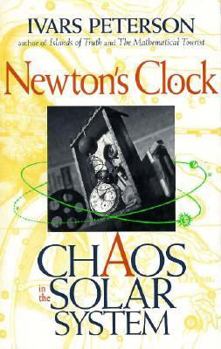Newton's Clock: Chaos in the Solar System
Select Format
Select Condition 
Book Overview
Astronomers, mathematicians, and physicists have barely got to grips with chaos, except as a 'problem' to be overcome. This book gives an excellent introduction to some of the issues and should be of... This description may be from another edition of this product.
Format:Hardcover
Language:English
ISBN:0716723964
ISBN13:9780716723967
Release Date:January 1993
Publisher:W H Freeman & Co
Length:336 Pages
Weight:1.36 lbs.
Dimensions:9.5" x 1.3" x 6.5"
Customer Reviews
4 ratings
Useful But Boring
Published by Thriftbooks.com User , 21 years ago
An artful combination of history and astronomy from the days of Newton and Kelper. The early mechanics of the solar sysem and the mathematical astronomers who offered theories of the same base as the current dynamic and chaos systems theories.
Highly recommended
Published by Thriftbooks.com User , 23 years ago
I read this book several years ago and write now from memory. I enjoyed it immensely. It provides a history of the discovery of chaos in Hamiltonian mechanics by Poincare', and includes the more recent extremely interesting work on chaos in the solar system by Sussman and Wisdom, including the construction of their special computer constructed to simulate solar orbits without accumulating floating point errors. The background is that we still, today, do not understand the 3-body problem in classical mechanics, except that Poincare' taught us that the orbits may be either chaotic or regular. Newton frustrated himself working on the problem (sun-earth-moon) and finally gave up.
Masterful combination of history and science
Published by Thriftbooks.com User , 24 years ago
When I first saw the title of this book, I thought "Oh, no, not another chaotic chaos book". There are tons of popular math, physics and astronomy books out there that maybe are useful for people who don't know any math, but who are totally confusing to people who know a bit about the topics. Why? Because the authors themselves are totally confused. But fortunately there's a small handful of scientists who can write. Ivars Peterson is one of them, and I when I saw that he was the author, I knew right away that this was just the thing I needed for the 5 hours airport stopover that was ahead of me!
Exploring the outer reaches of chaos
Published by Thriftbooks.com User , 25 years ago
To those with an understanding of the history of astronomy, the title of this book is inherently contradictory. Chaos is a recent term used to describe systems where slight alterations lead very quickly to unpredictability. And yet, every beginning astronomy student is told that slight differences in the observed and predicted orbits of Uranus led to the discovery of Neptune in the location predicted by Newtonian mechanics. Furthermore, space probes have been launched that flew within the cosmic equivalent of a bacterial eyelash of the outer planets after years of travel. Some day, when you have nothing to do, look up the distances traveled by those probes, the point of closest approach, and compute the percentage error. Finally, all of the geological evidence indicates that the orbits of the planets have been stable for billions of years. So, what does the title mean? In fact, not much, except perhaps a rethinking of what events one can consider to be chaotic. When only the non-Plutonian planets are considered, the only conclusion is that the solar system may be chaotic in the long term. In this case, this means over billions of years. One must be essentially immortal to consider such events chaotic. If one's expectations are significantly lowered to include slight unpredictability due to the complexity of the system, then one can "argue" that there is chaos. But again, the term is normally used to describe systems with large, not miniscule, deviations resulting from miniscule deviations. Pluto is the planetary exception. It is small, appears to be almost totally made of ice and its orbit is unusual. The asteroids and comets, flyspecks all, are easily perturbed and while their behavior is chaotic, it seems trivial to call the solar system chaotic based on that. Given these initial conditions, the author does a good job in presenting the material. The quality of the writing is what one has come to expect from Peterson. Many recent discoveries are presented that point out that the solar system may not be as stable as it appears. Explanations are textual, not mathematical in nature. While the term chaos is being overextended here, it is not flagrantly so, forcing a rethinking of what it actually means. And that is a nontrivial point. Is a system that is unpredictable over billions of years really chaotic? Can a system be considered chaotic if some very tiny pieces exhibit chaotic behavior? Are there unknown forces that serve to dampen out the chaotic tendencies of the major planets? Those questions are considered here. If you like mathematics or physics or astronomy you will like this book. If you enjoy any two, then you will love it. An aficionado of all three will find their mind floating among the heavenly orbs. Published in Journal of Recreational Mathematics, reprinted with permission.






